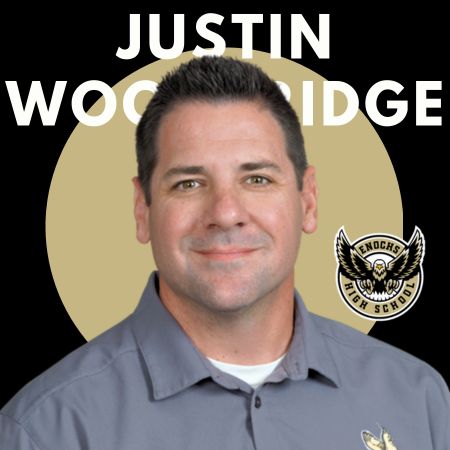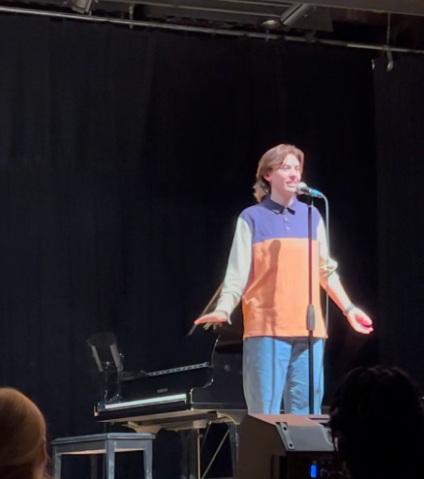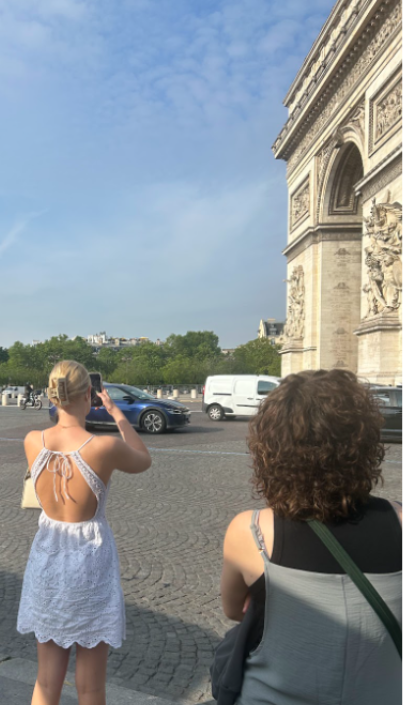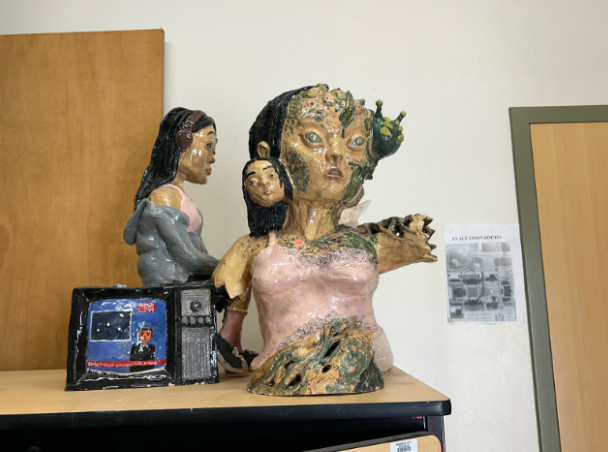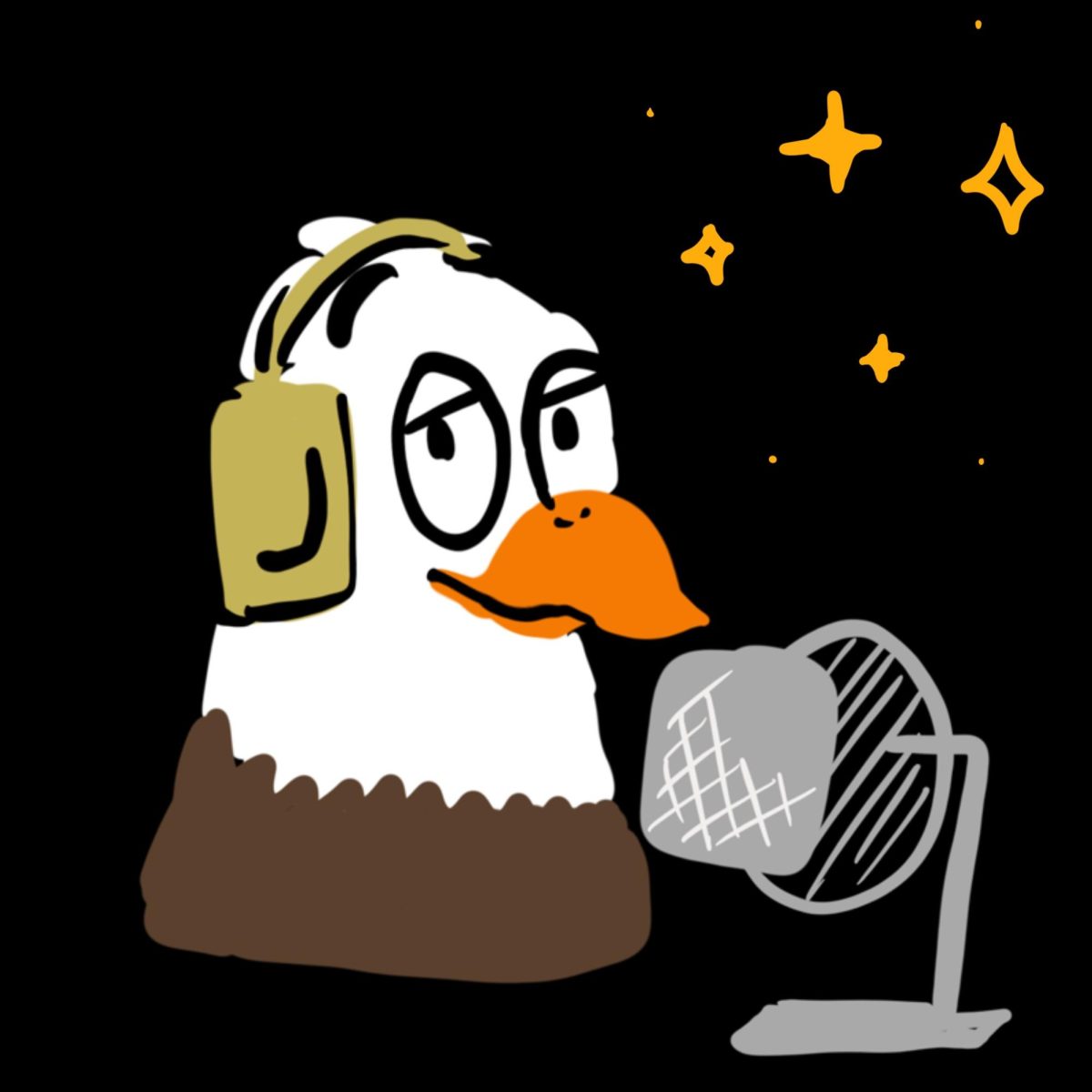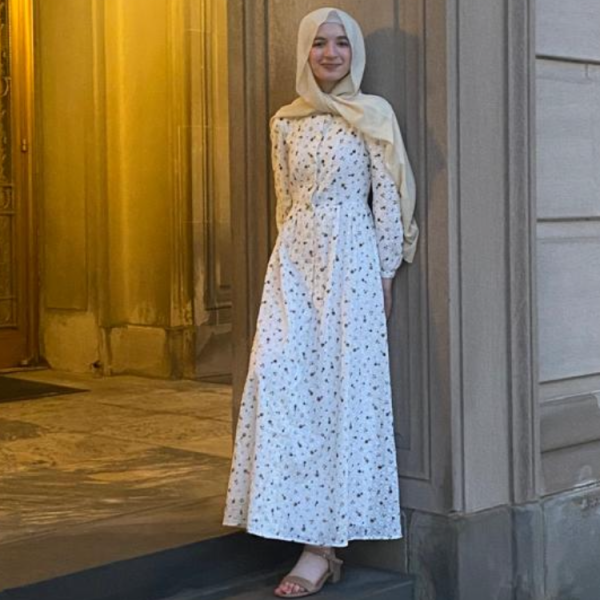Justin Woodbridge is serving his first year as Enochs’ official principal for the 2023-2024 school year, and the Eagle Eye interviewed him a couple of weeks back about him as well as his visions for the future of Enochs.
- For those who don’t know, how did you come into your position as principal?
“I was a principal at Fremont Elementary School and really loved my time there, loved the age group, loved elementary folks and all the people I worked with, but had an interest and a passion for working with high school students. And so, I was really looking for opportunities for something like that. I taught high school as a high school resource teacher, [and] started as an elementary special education teacher. I’m so fortunate to have worked in elementary as a teacher, junior high school as a teacher and then high school as a teacher.” Woodbridge explains. “Those experiences were great because I was able to experience all the different ages and grades in schools and really enjoyed my time at every place, and then got into school administration and, like I said, wanted to get into the high school, and I was fortunate enough to get hired at Gregory High School as an assistant principal for a couple of years, did that. Then this opportunity came up as the principal position here, and I was fortunate enough to slide into this role last year and then become a kind of official midway through the year. And that’s how I ended up here kind of for real this year.”
“I was appointed as an interim principal and then was able to move into full time and be appointed the principal last year about midway through the year,” said Woodbridge.
2. Detail a little bit about your education, qualifications, and achievements.
“So I was a student in Modesto City Schools [from] kindergarten through 12th grade. I was the 4th generation of my family to go through Modesto City Schools. So I have a deep passion and respect for our community. And that’s one of the reasons why I love my job and wanted to get into administration. Because, I want to make a difference, help people out, help kids out. And at the high school level, get kids out into the community to be successful right away because, like I said, generations of my family have lived in Modesto. And, I’m actually the fourth generation of my family to graduate from Modesto High School, which is crazy. I went to Modesto High. My dad went to Modesto High. My grandpa went to Modesto High and my great grandpa went to Modesto High. Kind of sad. Huh? Like we should move somewhere maybe. But, you know, in some ways, kind of neat. And so, I was a student born and raised, went to Martone Elementary School and then I went to Roosevelt Junior High School and then I went to Modesto High School.
I went to Modesto Junior College after Modesto High School. I played sports and I thought, ‘I’m gonna play sports for the rest of my life’. I wasn’t very fast, couldn’t jump very high, but played baseball at Modesto Junior College. And that was like my, outlet, my passion, my focus, my energy was all on sports. Well, you know, you get to some point where you’re like, ok, I’m not gonna be a professional, whatever. For me, I had a really, really deep passion for athletics. And so I actually always wanted to be a P.E. teacher and a coach because I played sports. It made sense. I love sports, I love kids, I wanna work with kids. And so, I was a P.E. major from MJC. I went to Stanislaus State in Turlock and started helping coach at Modesto High School where I went. [I] coached football and baseball for a couple of years, was the assistant varsity baseball coach and assistant varsity football coach.
For a couple of years there I actually coached with some coaches I had as a player. So it was really, really cool to go back while I was going through my credential program at Stanislaus State. I was offered a special education position where I started in Turlock. I accepted that position at an elementary school in Turlock, and I was a special education teacher at the time.
I taught elementary, emotionally disturbed students with unique needs. and then had really had some great mentors, leaders, teachers. I worked with great administrators. I always loved leadership because that was kind of natural for me in athletics. And so, I kind of knew I wanted to get into leadership at some point, and was encouraged to maybe look into administration.
So, as I finished my teaching credential, I enrolled in the masters and administrative credential program at Stanislaus State and finished that while, like I indicated, I was hired as an assistant principal at Fremont Elementary School for a year. I knew I wanted to be the best leader I could be for teachers and classified staff that I worked with and would eventually hopefully be charged with serving or supporting kids as well.
And so I thought, ‘If I’m gonna be in charge and be in a leadership role to help kids and staff, I need to have a lot of information, I need to know things, right?’ And so that was the encouragement for me to enroll in the doctorate program at Stanislaus. So I went through the doctorate program, got my doctorate there at Stanislaus State. Because I was like, ‘I wanna know [and] have the most information to help kids out.’ ”
3. What is your favorite part about being principal?
“I love Enochs. I love being a principal. I love being a principal at Enochs. And I would say the people are the reasons why I love my job. Like I said, we have the best kids, the best families, the best staff. Our staff would be number one. They’re amazing.
I love the job because it doesn’t happen every day, but we really get to see the impact of our work on kids. It can be hard, it can be challenging, but there are moments where what we do makes a difference and we’ll see tangible examples of that and that’s super motivating. I love seeing kids that struggled, that we help, [that] we met with [and] worked with and now they’re being super successful and off to college or a career.
I like working with staff that are great and want to get better, and we see some of those skills continue to get better in the classroom or behind a desk if they’re a secretary. I think for me, it’s the satisfaction that [comes with knowing] we really are able to make a difference, not only in our school, in the lives of our staff and kids, but also in our community.
I think we have a huge responsibility, a moral imperative if you will, to make sure that we’re not only helping kids for today in our classrooms, but we’re helping our community by sending kids out into our community, because most of the kids are gonna stay right here like me, fourth generation, right?
They have the skills to be successful. And if we don’t send kids out into our community with the skills to be successful, they’re not gonna be successful, and that’s gonna impact our local community. If we can’t send kids out that are gonna go to college or get a job, then they’re gonna struggle. And that impact is gonna be big on our local economy in Modesto. And we don’t want that. So I think it’s super cool when I walk around to restaurants and I see our students working there even after they graduated or run into somebody at a hospital or something and now they’re a nurse.
Those opportunities are great and I think we as educators have a great responsibility to impact lives for many, many, many years to come.”
4. What is a message you’d like to give students at Enochs?
“I would say for students that are reading this article, have confidence in yourself, aim for greatness, have high expectations of yourself because you’re gonna reach the goals you set for yourself.
If you set low goals, you’re gonna reach those low goals. If you set high goals, you’re gonna reach those high goals. Build relationships with people around you, with students, with teachers, with administrators, with camp supervisors, with secretaries, because we don’t want students to do things alone. There’s tons of supports and we all want to help.
I would say if kids need anything, reach out, find somebody, find somebody to connect with. Whether it’s a teacher or administrator or a supervisor or a secretary or a nurse or somebody, find somebody that you’re comfortable with, because we all want to help. Don’t struggle alone if you’re struggling.
If you’re reading this, get involved in something. Get into a sport, get into a club, join Mock Trial, join Speech. There’s hundreds and hundreds and hundreds of things to do. We even have E-sports, which is a video game league. And so there’s really opportunities for all interests.
And I would say to end, represent Enochs really well. When we’re out in the community, when we’re on campus, when we’re at our friend’s house, we all represent Enochs. And we all contribute to the perceptions that people have of our school. And we’re fortunate to have pretty good perceptions out there and we want to continue to have those high expectations. It’s the same thing if you hear somebody say I graduated from Harvard. Well, the perception of that is, ‘Man, Harvard is like a hard school high achieving!’ There’s a perception around that. We really wanna continue that. When people hear you went to Enochs high school, they know, ‘Man, Enochs high school is serious. They do really well. They’re a top achieving school in our county,’ which we are.”
5. What are some plans and visions you have for Enochs?
“Enochs is such a great place. We have absolutely the best kids, hands down. Absolutely. The best staff, hands down. Our teachers and classified staff are amazing. We have some of the best people on the planet. What if I didn’t mean it? I just wouldn’t say anything. I worked at a number of different schools and there’s great people everywhere, but I just feel blessed and fortunate enough to work here with such amazing people.
Our vision this year is really centered around instruction, PLC (professional learning community) process and climate and culture.
We’re really focusing very heavily on those three things. specifically with instruction, we’re looking at providing the absolute best instruction to students the very first time. As a staff, we’re looking at effective instructional strategies and practices that are research based, and we’re looking at our data on student achievement and, as a team together, collectively coming up with some professional development that we’re gonna provide to our staff as far as training around those things we’re gonna be looking for.
[We’re] working together on how that’s implemented in the classroom. What support staff need, what supports do kids need? We’re really working hard around instruction. We’re providing professional development and feedback to our teachers. We’re getting teachers release time to go see other teachers. We’re having instructional coaches come in and provide in classroom on site instruction to both our administrators and our teachers.
We’re working with a creative leadership solution coach, who helps coach me as a leader, help coach our leadership teams as leaders and really look at how we’re doing things here with that aim to provide the best instruction for kids to help our students be the best students possible.
Our mission is to provide top quality instruction in a safe, respectable and responsible culture and climate.
We are working hard to align everything we do to that mission. Instruction would align to top quality instruction, which is listed in our mission statement. We’re really working hard around instruction. And I appreciate our staff and students hanging in there because sometimes it can be a challenge to really continue to improve and our staff is great because they’re open minded, they’re professionals, they’re hard working, and we’re all willing to help work and do things that’s best for kids. Sometimes that’s hard, because sometimes doing what’s best for kids is hard, but our staff have really embraced that.
PLCs [are] another thing that’s a huge focus for us. Every Wednesday, the the kids get out a little early, right? Then, teachers get together and collaborate or work together for about an hour, and during that time, there’s some very specific things that teachers do. We want students to learn, [thinking], ‘What’s the learning goal of the lesson?’ We’re doing a lot of work around PL CS and [we’re] proud of the work that our teachers are doing.
The next thing is climate and culture. You probably know that we’ve implemented 5-star this year as an application. That’s a tool that we’re using to do two things really.
One, [to] enhance safety on our campus. Every time a student’s out of class, they will either check themselves out to the bathroom or the nurse’s office or wherever they’re going, using a cell phone. And if they don’t have a cell phone, a teacher can provide them that digital pass on their own or on the teacher’s computer. What you guys probably have seen is we’re really working hard to make sure that we’re working with students who we see out of class not to continuously bug our students but to make sure that if students are out of class, that they have a pass, that they have a reason to be out of class and that we get students back to class as soon as possible. What we are super great and fortunate at Enochs [for] is, you look out at any point during the day, you don’t see a whole lot of kids out of class, they’re in class learning and that’s what we where we want kids. But the idea is, we’re rewarding positive behavior and recognizing positive behavior in an effort to increase the likelihood of positive behavior on campus, right?
The other piece that this 5-Star tool is helping us do is actively monitor student participation in activities and events. We know that when students are connected to a club, a sport and activity that they’re more engaged, that they’re gonna be more successful. We log all the athletes who are playing a sport, all the students that are in a club, any time a student checks into an event or buys tickets to a dance, it goes into the system and we’re able to monitor students that are not participating. Those kids not engaged in schoolwide activities, we’re actively seeking out those students and trying to get them connected with something because we have a number of kids who aren’t going to dances, who have never been to a football game, who aren’t involved in Mock Trial, who aren’t playing a sport or are in a club. We really want to try to get those kids connected with something and so that I would say is a large effort of ours [as well as] climate and culture for kids, doing fun stuff at lunch, doing club rush, doing fun activities, giving away ice cream, really just trying to create a positive culture.
We wanna recognize that our teachers and classified certificated staff work super hard, that the job is hard and [that] we’re working hard to recognize them. For example we gave them all Crumbl cookies the other day at a faculty meeting. I know it sounds silly and it’s kind of small but to feed 100 and 30 teachers can be expensive. We do, ‘you’ve been booed!’, which is something that we do kind of every holiday. Halloween is an example. We get staff to sign up to put treats in a little baggy, we hang it on a teacher’s door and so, when they arrive in the morning, they have some fun treats, some goodies and the deal is now they have to go boo somebody else, right?
We have staff luncheons where we provide food for our staff. Again, it gets expensive to feed 250 people, but, as much as we can, we want to recognize our staff too.
The last thing that I would say we’re really starting to look at this year are our efforts and how we’re preparing students for college or [their] career. We have a committee that is looking at what we’re doing for each grade level as far as what are our counselors providing, what is our work experience teacher doing? What is our career navigator doing? What are our teachers doing in the classroom? We’re really looking at, ok, what are we doing for freshmen to prepare them for college or careers? What are we doing for sophomores? What are we doing for juniors? What are we doing for seniors?
Because our mission here at the high school level is to, one, [we] wanna graduate every single student, but two, graduate them with a plan with the skills to be successful and a plan to be successful after high school. Counselors are providing presentations, our college counselors [are] doing college presentations, we’re doing college workshops, we’re signing up kids for internships and apprenticeships with high school, we have work experience, we’re working with local companies, we’re doing all these great things, but we’re really making sure that we’re all aligned in what we’re doing and that each year, kids get supports and services that build them up to be able to leave as seniors with a solid game plan.
Our seniors that are reading this know this, but our counselors met with every senior and had them indicate their plan after high school. What are they gonna do? Are they gonna go to the military? Are they gonna go to college? Are they gonna go to UC? A private school? Are they gonna get a job right at high school and get into a training program, an apprenticeship, something like that?
Now we’re gonna be working for the next six, seven months of school to make sure that, hey, if you indicated that you’re going to go to college, we’re gonna make sure that we provide a college workshop where you understand the financial implications, that you complete [the] FAFSA that we help support you in completing your college application.
So that way, when you leave us as seniors, we’ve done everything we can to get you in the right spot and same thing for careers. Have we connected that student with some job skills? Have we connected that student with the right coursework to help support them? Have we connected them with local businesses and apprenticeships?
That’s gonna be a three or four year plan for us. But we’re just in year one right now. This year, we’ve identified with students what they want to do after high school, and we’re working to support them to make sure that’s gonna happen. We’re also looking at some college trips, we wanna make sure that students who maybe don’t have the opportunity to drive down and take a college visit somewhere, we’re gonna provide that opportunity for students. ”
It’s clear to see that Mr. Woodbridge is excited for the future. And it’s clear to see that our administration is constantly and consistently working extremely hard to provide the best for us as Enochs students. After this interview, my head was swimming, and all I got was the basic outline of what Mr. Woodbridge has planned. I can only imagine the immense effort it must take to implement all these plans in a matter of years.
So the next time you meet Principal Woodbridge, wave hello, maybe thank him for his efforts, and consider him with the respect and appreciation he deserves. Go Eagles!

